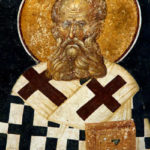We run our website the way we wished the whole internet worked: we provide high quality original content with no ads. We are funded solely by your direct support. Please consider supporting this project.

Rethinking Transcendence
Going back to pre-Socratic philosophers and running through the major strands of the church’s theological tradition, the conception of how God (or, in ancient Greece, “the One”) was arrived at primarily by negating the contingent features of the world that were deemed inferior and in need of explanation. God transcended the world, for example, by being altogether unchanging in contrast to the ever-changing world. So too, God transcended the world by being altogether necessary, in contrast to the world that is contingent. And for this reason, God’s transcendence was necessarily conceived of over-and-against the revelation of God in Christ. God’s transcendence is the mysterious “wholly other” that remains unknowable and incomprehensible after God has revealed himself.
There are a host of philosophical and theological objections that could be raised against this view. For example, while I grant that God’s being is unchanging, why should we conclude God’s experience is unchanging? So too, why should we assume that a being who lacked the capacity to change in any respect was superior to a being who possessed this capacity? And could a being that lacked the capacity to change in any respect be considered a personal and relational agent? How could an utterly unchanging being responsively interact with other personal agents?
Without entering into a full discussion of these philosophical issues, let’s consider them by looking at them through the revelation of Jesus on the cross. Consider, would it ever occur to anyone to think that God is “above” experiencing things sequentially, or that God is “above” experiencing any kind of change, if they anchored all their reflections about God in the Word who became flesh (Jn 1:14) and who then offered himself up on our behalf? And would it ever occur to anyone to imagine that God is “above” being affected by others and “above” experiencing passionate emotions or suffering if their thinking about God was consistently oriented around the one who suffered humiliation and death at the hands of wicked humans and fallen powers? I, for one, do not see how. The revelation of God on the cross runs directly counter to the divine attributes of the classical philosophical conception of God.
We could argue the same for a host of other classical attributes. For example, would it ever occur to us to think of God’s omnipotence as all-controlling if we resolved that the crucified Christ was the perfect expression of God’s power (1 Cor 1:18, 24)? What the cross rather reveals is that God’s power is nothing other than the power of his influential, self-sacrificial love. Indeed, since the cross reveals God down to his very essence, all the metaphysical attributes of God must be viewed as aspects of this love. From a cross-centered perspective, for example, God’s immutability must be seen as simply expressing unshakeable steadfastness of his cruciform, covenantal love (e.g., Mal 3:6). And, far from implying that nothing can affect him, the cross reveals that, for the purpose of love, God chooses to open himself up to be influenced and affected by others.
I am not in any sense trying to minimize the incomprehensible, transcendent, “otherness” of God. I am simply saying that, instead of defining this “otherness” over-and-against the revelation of God on the cross, we must rather define it by means of the cross. For while the crucified Christ involved God accommodating the limitations, the sin, and the condemnation of humanity, God’s very eternal being is revealed in, not against, this accommodation. And when we proceed in this cross-centered fashion, I submit that we arrive at a conception of God’s incomprehensible “otherness” that is far more grand than we get when we simply negate features of the world.
Could any mere negation be more incomprehensible than the depth of love that motivated the Son to set aside the bliss of his communion with the Father and Spirit and to dive into the self-created hell of a race of rebels? Could any mere negation strike us as more mysterious than the God who manifested his greatness by becoming a zygote in the womb of an unwed Jewish peasant girl? And could there be any greater indicator of the “wholly other” nature of God’s transcendence than the fact that God’s holiness was most perfectly displayed when God became our sin (2 Cor 5:21) and the fact that God’s perfect loving unity was most perfectly displayed when he became our God-forsaken curse?
In my estimation, the classical conception of transcendence that is arrived at by negating features of the contingent world pales in comparison to the conception we arrive at by affirming the transcendent features of God’s revelation on the cross.
Image by Christopher JL via Flickr
Category: General
Tags: Classical Theism, Cruciform Theology, Philosophy, Transcendence
Topics: Interpreting Violent Pictures and Troubling Behaviors
Related Reading

The Greatest in the Kingdom (2 of 2)
Article by Natalie Frisk This post is a summary of what was discussed at the ReKnew CrossVision Conference in regard to what and how we teach our kids about the cruciform hermeneutic. Taking Jesus into the Old Testament I co-lead a family-friendly home church where we sometimes get into spiritually deep conversations with children. There…

Do We Read Bible-Violence to Children? (podcast)
Greg on children and Bible violence. Episode 658 http://traffic.libsyn.com/askgregboyd/Episode_0658.mp3

How NOT To Be Christ-Centered: A Review of God With Us – Part I
Theologians throughout Church history have used the concept of divine accommodation to account for everything in Scripture that seemed “unworthy” of God. Whatever didn’t line up with what we know about God was seen as God accommodating his revelation to our limited and fallen framework. The trouble is, theologians have, by and large, used the…

Where Psychology and Theology Meet
Guest post by Ty Gibson The biblical narrative reveals that God bears our guilt—not merely in the penal sense that Reformed theology asserts—but in the sense that He bears our misconceptions of His character as we project our sins upon Him. To the degree that fallen human beings find it psychologically impossible to bear the…

Reviewing the Reviews: Tom Belt (Part 1)
Tom Belt has written a four-part review of Crucifixion of the Warrior God on his blog An Open Orthodoxy. Parts 1 and 2 offer an overall fair and balanced summary of CWG, at least to the point that correcting misunderstandings would feel petty. In Part 3 Tom offers a critique of volume I, and this is what I’d like…

How the Church Fathers Read the OT
After the completion of the New Testament, the church fathers developed theology in their increasingly Gentile post-apostolic church in such a way that many of the distinctively Jewish features of the NT’s use of the OT diminished. However, this was not the case with regard to the Christocentric interpretation of the OT that was so…
